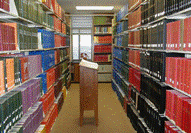Libraries, University of Nebraska-Lincoln

University of Nebraska-Lincoln Libraries: Collection Development Policies
Date of this Version
10-2019
Document Type
Article
Abstract
History: A. Special Collections: While rare books and manuscripts have been acquired since the University of Nebraska Libraries were first established, it was some time before a separate Rare Books and Special Collections unit was created. During the 1970s, librarians identified rare books or special collections within the existing general collections, identified new space for these materials, cataloged them, created collection development criteria, and began providing services through the assignment of the first full-time special collections librarian. One role for the special collections librarian was to seek funding through donations for continued development of the special collections. B. The Archives: the Archives were formed officially by the Board of Regents in 1968 with the appointment of the first University Archivist. C. Merger: In 1978, the Archives were merged with the Rare Books and Special Collections unit and became the Archives and Special Collections, University of Nebraska-Lincoln Libraries. Collection development policies and criteria for the Archives and Special Collections have evolved through the years as the mission and collecting scope have evolved.
Mission: The mission of the Archives and Special Collections is to select, preserve, arrange, describe, provide reference assistance and instruction for, and promote the use of rare and unique research materials and to collect permanent records of the University of Nebraska-Lincoln, Central Administration, and the Board of Regents. The unit maintains these research materials because they are best managed separately from the general collections due to their rare or unique qualities, source, physical form, or subject area.
Collecting scope: The Archives and Special Collections’ subject area concentrations spring from major research/education areas at the University of Nebraska-Lincoln (UNL) or are related to the mandated archival responsibility to collect permanent records of the University. The special collections are composed primarily of rare and unique documentary materials created and accumulated by UNL and its members as well as from individuals and organizations external to the University. Influencing all areas of collecting is an effort to be forward-thinking in collecting diverse voices, individuals, and organizations, and to consider social justice, gender identity, diversity and inclusion, and new cultural heritage collections relating especially to Nebraska. The collecting interests and the extent of collecting activity in them increases and evolve over time as academic research programs develop and change. The purpose of this approach is also to support the land-grant mission of the university and to provide the UNL research community, along with Nebraska citizens and the general public, with access to the rare and unique research materials these users require. Collecting decisions will, to the extent possible, maintain collective cultural history and anticipate future research needs of the University community. The majority of collecting is done at a research level.

